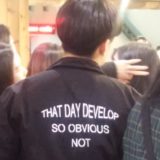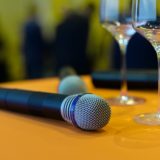The 5th Water Stop in the Couch to Korean Challenge
 Winter is coming to the Northern Half-sphere. Cold weather makes it harder to be motivated to run outside, but it makes it a lot easier to sit inside and study a new language. And since I just passed the 300-hour mark in the Couch to Korean Challenge, it is a good time for another water stop (even if the water is getting colder and less refreshing than in the summer). So today I’ll take a little rest and summarize the progress since the last water stop. It is coming up on 10 months since I kicked off the Couch to Korean Challenge with the goal of learning as much Korean as possible within one calendar year. I subsequently extended the initial goal from 12 to 14 months in order to accommodate the Lexplorers team trip to Korea in April 2018, so I now have about 4 months remaining in the Challenge.
Winter is coming to the Northern Half-sphere. Cold weather makes it harder to be motivated to run outside, but it makes it a lot easier to sit inside and study a new language. And since I just passed the 300-hour mark in the Couch to Korean Challenge, it is a good time for another water stop (even if the water is getting colder and less refreshing than in the summer). So today I’ll take a little rest and summarize the progress since the last water stop. It is coming up on 10 months since I kicked off the Couch to Korean Challenge with the goal of learning as much Korean as possible within one calendar year. I subsequently extended the initial goal from 12 to 14 months in order to accommodate the Lexplorers team trip to Korea in April 2018, so I now have about 4 months remaining in the Challenge.
As I progress through the Challenge, I try to schedule study sessions of at least 15 minutes every day (ideally at least an hour). In the 81 days since the last water stop I succeeded on 79 days; the 2 non-study days were the Thanksgiving holiday. In all, since the last water stop I logged a total of 88.75 hours of Korean study, bringing my total study time to 303.75 hours through the first 5 water stops. That averages out to (almost) exactly 1 hour per day over the 10 month period, and I expect that pace to pick up over the coming months as the April finish line comes into sight.
My training for the Couch to Korean Challenge has proceeded pretty much according to plan: I started with the fundamentals, then built a solid vocabulary and grammar base, then moved into the real-world domains of reading and speaking. In the first 100+ hours of Korean study (through the 2nd water stop), I focused on mastering the Korean writing and sound systems, establishing a solid understanding of the basic grammar, and learning about 400-500 words of vocabulary. In the second 100+ hours, I worked intensively on building my active vocabulary to about 2,000 words. This combined with additional grammar study left me well-positioned for the focus of the second half of the challenge: reading real Korean books (vs. textbook sentences) and putting it all into real-world practice with conversation.
Lexplorers posts during this phase related to the Couch to Korean Challenge:
- Resource Reviews: Clozemaster, Amikumu, uTalk
- Language Learning via Parallel Corpora
- Our 3 Favorite Language Learning Podcasts: Actual Fluency, Creative Language Learning, Lingthusiasm
- Flashcard App Showdown: Quizlet vs. Anki vs. Memrise
- Some Useful Korean Grammar Resources
- Resource Review: Duolingo Korean
- Korean Resources
Below I give the breakdown by category where I have spent the study time so far, with the current status of each category. Some of the study activities are a bit difficult to place into a single category. For example, reading example sentences for a grammar point and also listening to a recording of the sentence falls under three categories: Grammar, Listening, and Reading. Similarly, reading a Korean book with frequent breaks to look up and practice new words falls under both Reading and Vocabulary (as well as Listening when using the built-in Quizlet audio feature). I have done my best to divide study time accurately among the appropriate categories.
- Language basics and resources: The Korean writing and sound systems. Available resources for learning Korean. The history and culture of Korea.
- Time during this phase: 10 hours (38.25 hours total to date)
- Progress and Status: I continue to try out and evaluate Korean language resources, and I wrote up several resource reviews during this phase of the Challenge (see list above).
- Grammar: Studying syntax, morphology, and other grammar details
- Time: 17.5 hours (85.5 hours total to date)
- Status: During this phase I used the flashcard app Anki extensively to study the card deck Korean Grammar Sentences by Evita, which has over 2000 sentences in both Korean and English, with audio and grammar notes. This set contains a fairly comprehensive set of sentences demonstrating Korean grammar points. I also spent a few hours trying out Clozemaster, which is a fun app for reinforcing grammar and vocabulary using fill-in-the-blank questions. I feel that my grammar is solidly in the Advanced Intermediate level for written sentences (albeit with integrated audio for listening practice), and I only recently began shifting more into spoken comprehension.
- Vocabulary: Studying word lists and flashcards to learn new words
- Time: 11.25 hours (103.25 hours total to date)
- Status: Most of my time during this phase was spent reading Korean books vs. the standalone vocabulary study of the previous phase. However, as I read I also made notes of new words and added them to my Quizlet flashcard deck, which I studied regularly to learn and reinforce the new words. I would estimate my current active (reading) vocabulary at about 2300 Korean words.
- Listening comprehension: Listening to instructional recordings, news, and other Korean audio sources to build aural comprehension
- Time: 10.5 hours (34.5 hours total to date)
- Status: My listening time during this phase consisted of two sources. The first source was the audio for the 2000+ grammar sentences in the Anki deck (described above under Grammar); these were isolated instructional sentences listened to in the course of grammar and vocabulary study. Toward the end of this phase I also started to listen to daily Korean news podcasts from BBC News Korean and KBS World Radio. My comprehension of spoken Korean news at this point consists of recognizing isolated words and names, so that most sentences sound like this: “This week (something something) Russia (something) Pyeongchang Olympics (something) doping (something) (verb-with-formal-hamnida-ending).
- Reading comprehension: Reading Korean texts to solidify grammar and vocabulary
- Time: 39.5 hours (42.25 hours to date)
- Status: In this most recent phase of about 90 hours, I did a lot of Korean reading. This consisted of both textbook sentences (the Anki deck described above in Grammar) and Korean-language fiction books. As I wrote about in detail in Language Learning via Parallel Corpora, I read 75-100 pages of several books in Korean while using the English-language versions of the books to facilitate understanding. This allowed me to read much quicker and was much more enjoyable than trying to puzzle out the Korean sentences with a dictionary and grammar reference.
- Conversation: Talking with native Korean speakers to practice speaking and listening
- Time to date: 0 hours
- Status: nonexistent (still!)
The Couch to Korean Challenge is entering the home stretch, and I really need to focus on conversation in preparation for our trip to Korea in April. My plan for the next phase is to immerse myself in Korean listening and conversation as much as possible. I will still continue reading Korean books to build and solidify vocabulary and grammar, but listening comprehension and conversation have to be the priority. As always, I will also continue to work on writing up reviews of the resources that I have used so far during the Couch to Korean Challenge (as updated on the Korean Resources page).
Share this Lexplorers post:









